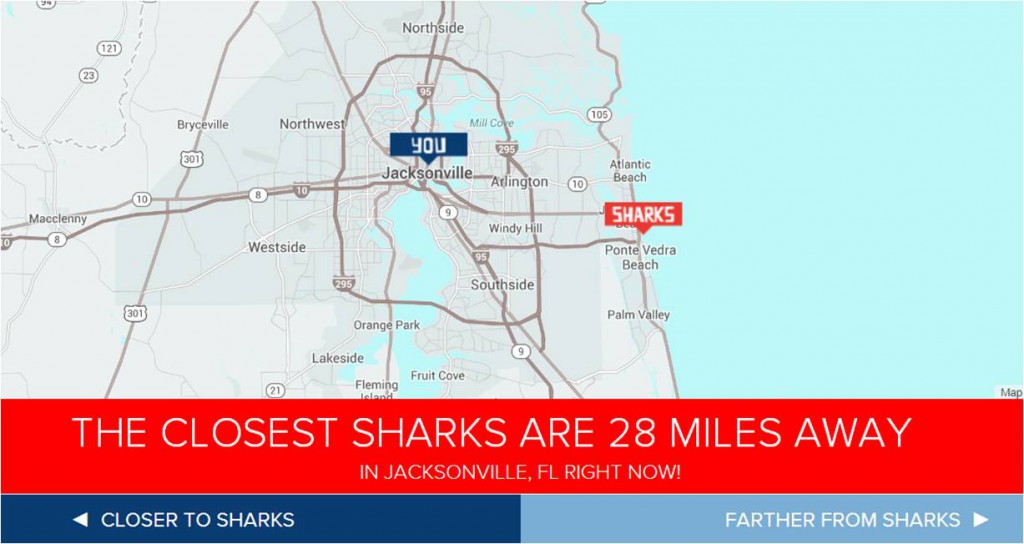That’s a Wrap! Capitalizing on Shark Week, PR mistakes surrounding the death of Robin Williams, the growing pay gap between public relations and journalism and why women are taking over PR

If you haven’t gotten your Shark Week fix, it’s time to act fast. Shark Week ends on Saturday, and plenty of savvy marketers have already capitalized on Discovery Channel’s most popular week of the year. However, while those marketers were cooking with gasoline, others seemed intent on only burning themselves and their clients with ill-conceived public relations pitches surrounding the death of comedic legend Robin Williams. Capitalizing on shark week? Great idea. Capitalizing on a tragic celebrity suicide? Terrible idea.
Here’s the best and worst from the world of public relations this week, along with some new research showing public relations is not only a growing field but also an industry full of women.
Marketers cash in on Shark Week
Cue the Jaws theme…it’s Shark Week! Along with Discovery Channel’s own Shark Week promotions, this week we’ve seen several marketers creatively piggyback on Shark Week. Our very own Heather Kingry tweeted about Shark Week and received a fun and unexpected response. Here was Heather’s tweet:
Love learning new things and getting scared! Addicted to #SharkWeek
— heather kingry (@yrgnik) August 14, 2014
Season Sardines decided to get in on the Shark Week action and respond to Heather:
@yrgnik Here’s something to learn about that is really good for you #SardineWeek pic.twitter.com/cMdeIXSygi
— Season Sardines (@SeasonSardines) August 14, 2014
Not only did Season Sardines use a timely topic to reach out to potential consumers, the company also found a fun way to tie in their product with Shark Week!
Another example: Travelocity partnered with McKinney to create HowHowFarAmIfromSharksRightNow.com, a website that shows you where the closest sharks are to your location. The Reputation Ink office is just 28 miles from sharks!
The interactive map allows you to click where sharks have been spotted and book a trip, or if you’d rather get as far away from them as possible, the Travelocity Roaming Gnome — the brand’s trademark gnome — will show you the closest shark-free travel destinations.
Capitalizing on Shark Week is good…attempting to capitalize on the death of Robin Williams is not
It’s tough to catch the attention of journalists, and as someone who holds dual roles as a journalist and public relations professional, I do generally encourage tying your pitches to timely events and news. It should go without saying that when that event involves death you should proceed with caution. Unfortunately though it must be said, because the Washington Post has devoted an article to detailing some of the worst pitches they received from public relations professionals offering up their clients for comment following Robin Williams’ suicide this week.
The Washington Post journalist noted that one pitch she received, which involved a cyber security expert warning against would-be identity thieves luring unsuspecting victims with links promising details of Robin Williams’ death, would have interested her had it been broader and sent after some time had passed:
“Not all of these pitches are necessarily terrible — a broader version of the identity theft pitch, drawing on more examples, and pushed out after a more decorous interval might have been a story I was interested in writing,” the journalist said. “But it rarely seems to occur to folks that patience might serve them and their clients better (as would more targeted pitches).”
Although jumping on a relevant news story as soon as possible might serve you well in most instances, doing so in the event of a death is trickier. Unless your expert can provide very detailed information on the circumstances surrounding the death (i.e., they actually treated the person or they’re an expert on the known cause of death who can provide context to reporters covering the story), it probably isn’t advisable to contact journalists with pitches.
Public relations outpacing journalism in both sheer numbers and salary
The ill-advised PR pros pitching loosely tied stories to journalists on issues related to the death of Robin Williams are doing so as a natural reaction to the growing competition for media coverage. With digital marketing becoming an essential part of any corporation’s marketing strategy, the need for public relations specialists is rising at the same time the demand for traditional print is decreasing. It’s why journalists find their inbox inundated with press releases (and why you must learn how to hook journalists with your subject line); public relations specialists outnumber reporters by a factor of nearly 5 to 1.
That being said, there is a growing demand for public relations professionals in today’s market, and many of those journalists being cut and squeezed out of traditional print media are exploring careers on the other side of the fence. According to stats from the U.S. Bureau of Labor Statistics analyzed by Pew Research Center, the average public relations professional now makes almost $20,000 a year more than the average journalist.
As it turns out, public relations is a more lucrative field for those just starting out as well. A survey from the University of Georgia found new graduates taking a job in public relations earn an average of $35,000 per year, compared to $30,000 for those going to work at daily newspapers and $29,000 for those starting out in television.
Is public relations a woman’s world?
Other revelations from the Bureau of Labor Statistics data shows women account for 63 percent of all public relations specialists. The Atlantic points out other research has pegged that number even higher at 73 and 85 percent.
Why are women flocking to public relations? A reporter at The Atlantic posits it’s because of the growing pay difference between public relations and journalism. The average full-time female worker in the United States makes $37,232. While female journalists come in higher at $43,326 on average, female public relations specialists bank $55,705 on average.
The writer also points out that when you add advertising into the equation women make up 60 percent of the “the people shaping your media messages.” That makes sense if you ask me. Guess which sex makes approximately 85 percent of consumer decisions? Women. It’s also estimated women will control two-thirds of the world’s wealth in the next decade. Who better then to shape marketing messages than women?










Great insights on timeliness! And thanks for keeping an eye out for these things! It’s great to see the integrity and empathy. Reputation Ink does an outstanding job!